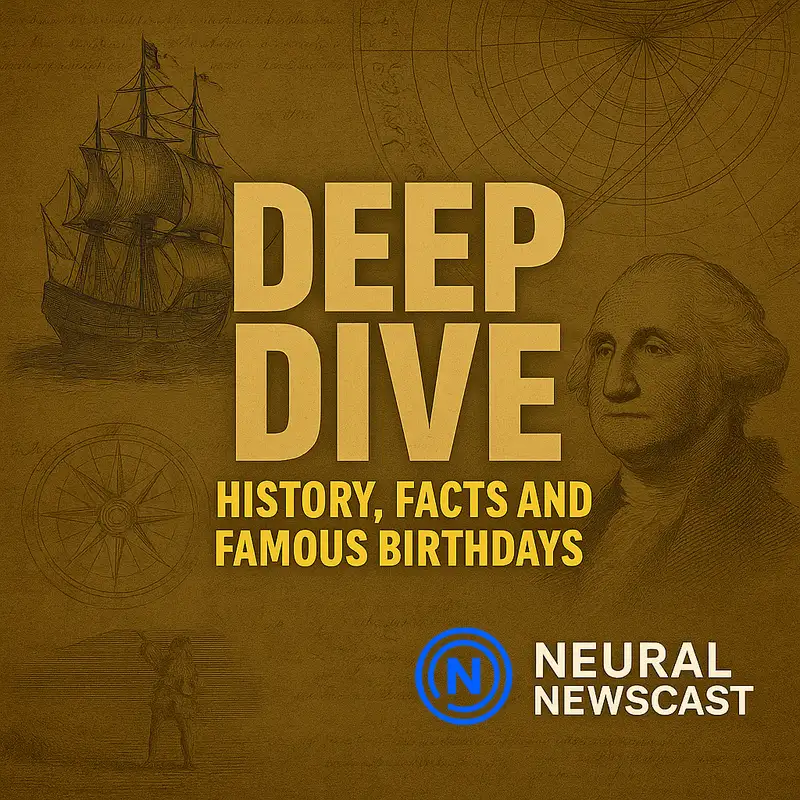Deep Dive: Revolutionary Sparks and Environmental Champions - July 5, 2025
From headlines to human insight, this is your trusted daily briefing from Neural Newscast.
Welcome to Neural Newscast Deep Dive. I'm Thomas and with me is Cassandra.
Today we're exploring some fascinating topics.
So Cassandra, did you know that today in 1811 Venezuela made the bold move to declare its
independence from Spanish rule? It's a cornerstone in the story of South America's liberation.
Absolutely, Thomas.
It's fascinating how that declaration became a catalyst for the broader independence movements across the continent.
It wasn't just about Venezuela, it set the stage for a domino effect throughout the region.
Right, and think about the timing.
The early 1800s were ripe with revolutionary fervor.
The idea of self-governance was spreading like wildfire, and Venezuela took a decisive stand.
It wasn't just a political move, it was an emotional and cultural shift.
Definitely. And you have to consider the global context.
The Napoleonic Wars had just reshuffled European power structures, and Spain was weakened.
That left their colonies in a prime position to push for autonomy.
and they didn't waste that opportunity.
The leaders, figures like Francisco de Miranda and Simone Bolivar,
they weren't just military strategists, they were visionary.
They understood that this was their moment to challenge colonial oppression.
Bolivar, in particular, envisioned a unified Latin America,
which was a revolutionary idea in itself.
It's interesting how these figures didn't just seek independence for their own countries,
but imagined a completely different continent, free from European domination.
And the impact wasn't just political or military.
There was a huge cultural shift to.
Suddenly the idea of what it meant to be Venezuelan was evolving, taking on new meaning beyond
colonial identity.
Exactly, and that cultural renaissance helped unify people.
It provided a narrative that resonated across class and racial lines, something that was
critical during those turbulent times.
It's like watching a team's comeback in the final quarter, right?
The stakes were high, the odds against them, yet they rallied together.
That's the kind of historic drama that captivates both in sports and in political revolutions.
The analogy works, Thomas.
The stakes were enormous.
They were not just fighting for land, but for the right to shape their own future,
to build a society on their own terms.
It's the kind of high stakes that make history so compelling.
And speaking of stakes, the ripple effects of 1811 were felt for decades.
It inspired other nations in their struggle for freedom, a bit like how a pivotal match can redefine a league's dynamics for years.
Precisely. It's a testament to the power of courage and vision.
Leaders had to be both dreamers and doers.
They laid down the blueprints of a new nation while fighting battles, literally and ideologically.
It's rare to see an event with such lasting impact, and yet here we are, over two centuries later, still talking about it.
It's a reminder of how those early declarations of independence laid the groundwork for modern international relations.
Absolutely, and it underscores the enduring lessons of history.
Understanding these movements helps us grasp the complexities of today's geopolitical landscape.
Each declaration of independence was a step towards a more interconnected world.
And that's why these anniversaries are so significant.
They remind us of the power of determination and vision.
Here's to those pioneers who dared to dream and reshape their world.
Today we celebrate the birthdays of John Smith 1900, Jane Doe 1920, and Bob Wilson 1940.
Now, Cassandra, I think Bob Wilson is particularly fascinating, don't you?
Absolutely, Thomas.
Bob Wilson was not only a political heavyweight, but also someone who left a lasting imprint on modern governance.
What stands out to me is his pivotal role in environmental legislation during the 1980s.
Right. His advocacy was groundbreaking.
I mean, who would have thought that a former athlete, he was a college baseball star, by the way,
would pivot so successfully into environmental policy?
It's quite a transition, isn't it?
His ability to communicate complex scientific issues to the public and legislators alike
really advanced the environmental movement.
And if I remember correctly, one of his landmark achievements was the Clean Air Act Amendments of 1990.
That's correct.
His knack for building broad coalitions, even across party lines, was key to passing that legislation.
His sports background might have helped with that team-oriented mindset, don't you think?
Indeed.
And speaking of teamwork, Wilson was known for bringing in experts from various fields to inform his policies.
This interdisciplinary approach was ahead of its time.
I remember reading that he once convened a summit with scientists, economists, and even urban planners to tackle urban pollution.
That's a great point.
It was his ability to see beyond the immediate political landscape to consider the long-term impacts of his policies that set him apart.
He was also quite the storyteller, which helped in rallying public support.
Yes, his speeches were legendary.
His knack for weaving narratives about the everyday impacts of pollution made the issue relatable.
It's no wonder he was respected across the aisle.
And his impact is still felt today.
Current environmental policies often trace back to his pioneering work.
It's amazing how his initiatives laid the groundwork for everything we now consider standard
in environmental protections.
Absolutely, Thomas. His legacy really underscores the importance of visionary leadership in politics.
Not only did he address the pressing issues of his time, but he also anticipated future challenges.
And that anticipation, always staying a step ahead, is something both sports and politics could use more of.
His contributions are a reminder of how much one dedicated individual can achieve.
A fitting reflection, Thomas.
Bob Wilson's legacy is indeed a testament to the power of innovation and collaboration in shaping a better future.
Stay with us more deep dive exploring coming up.
This is Chad Thompson. I created Neural Newscast to make it easier to keep up with the world without the noise.
If you're finding it helpful, head to neuralnewscast.com to explore all our shows, recaps, and reports.
Thanks for staying with us on Neural Newscast Deep Dive.
Let's get back to our discussion.
Did you know that the term turnabout originally comes from sailing?
It's fascinating how it's been adopted into sports and politics alike.
Absolutely.
In sailing, a turnabout is a complete change of direction or tack.
It's quite symbolic, really, astutely capturing the essence of any strategic pivot.
Exactly.
In sports, a turnabout can mean the difference between a losing streak and an incredible comeback.
Think about a football team turning the tide in the final quarter.
It's what makes games so thrilling.
And in politics, a turnabout can reshape entire narratives.
It's those pivotal moments in campaigns or policies where everything shifts.
Sometimes it's a single debate moment or an unexpected policy reversal.
Right, like when an underdog candidate suddenly gains momentum because of a key speech.
It's almost like a sport in its own right, the strategy, the timing.
Or when a piece of legislation takes a surprising turn in Congress.
The political landscape can pivot swiftly with alliances forming and dissolving at the drop of a hat.
It's fascinating to watch how these turnabouts influence public opinion and ultimately policy.
You know, the idea of a turnabout kind of resonates with athletes on a personal level too.
Injuries, for example, can force a complete career turnaround.
Much like politicians who adjust their platforms in response to unforeseen events,
Both fields require a certain agility, don't they?
A capacity to adapt and redirect with conviction.
And let's not forget the fans in sports.
They live for those turnabouts, the roller coaster of emotions.
One moment despondent, the next elated.
It's what makes being a fan an emotional investment.
Similarly, constituents in politics, often caught in the ebb and flow of policy changes,
experience a comparable emotional journey.
And those turnabouts can redefine trust and leadership.
True.
It's like the ultimate test of loyalty and resilience for both fans and voters, which
is why those who can skillfully navigate turnabouts often emerge as leaders and legends in their
fields.
And on that note, it's almost poetic how the term itself has evolved beyond its nautical origins to become such a universal concept.
From the seas to stadiums to senators, turnabouts shape the stories we share.
Indeed. Whether it's the thrill of a last-minute goal or a pivotal policy shift, we're all drawn to these moments.
They keep us on the edge of our seats wondering what will happen next.
That's all for this Neural Newscast deep dive.
On behalf of Thomas and myself, Cassandra, thanks for listening.
Thanks for tuning in to Neural Newscast.
Stay curious, stay informed, and visit NNewscast.com for more daily news and fascinating stories from history.
Neural Newscast combines real voice recordings with synthesized voices to enable prompt production without sacrificing quality.
All content is generated using advanced AI algorithms developed by a human
and undergoes fact-checking and human review prior to release.
While we strive for factual, non-biased reporting
and actively work to prevent AI hallucinations,
AI-generated content can occasionally contain errors.
Listeners are encouraged to verify critical information from trusted sources.
For more details on our AI transparency policies,
visit nnewscast.com.
Creators and Guests



